Collaboratorium
(a.k.a. Mind-Lab – ‘Laboratory for Collective Intelligence’ )
Join the Mind-Lab community for updates & invitations
Visit Synergistics for background, projects, themes, tools

Exploring at the human frontiers in this turbulent century … we see runaway climate change – invasive surveillance – post-truth extremist power grabs…. but also we see many possible synergies and pathways ahead.
To live together on a small planet, we need new ways of organizing cities and economies and societies. This calls for a new operating system, one of collective intelligence . The result could be a Symbio-polis , based on collaboration and co-evolution – not so much “winner takes all”, but “winners are all“. Such qualities are potentially everywhere in human systems – i.e. the capacity for learning, communication, creation and co-production – between a wider stakeholder community, with deeper layers of value and meaning. For instance,
- ‘collective climatic intelligence’ – finds the synergies between energy suppliers, government, business, and the public, desperately needed for climatic cooperation local and global;
- CHAI (‘collective human-artificial intelligence’) – combines the potential of digital with human systems
- ‘collective governance intelligence’ – empowering the many not the few, with multiple objectives, responding to uncertain times,
In these and many others we are all beginners – but very interesting times lie ahead. So this Collaboratorium aims to advance the state of the art on collective intelligence – exploring, debating, testing with an experimental zone of case studies.
We have case studies in four main themes at the moment: cities, ecologies, technologies, and the foresight process which puts them together. For more on these see the Collaboratorium themes
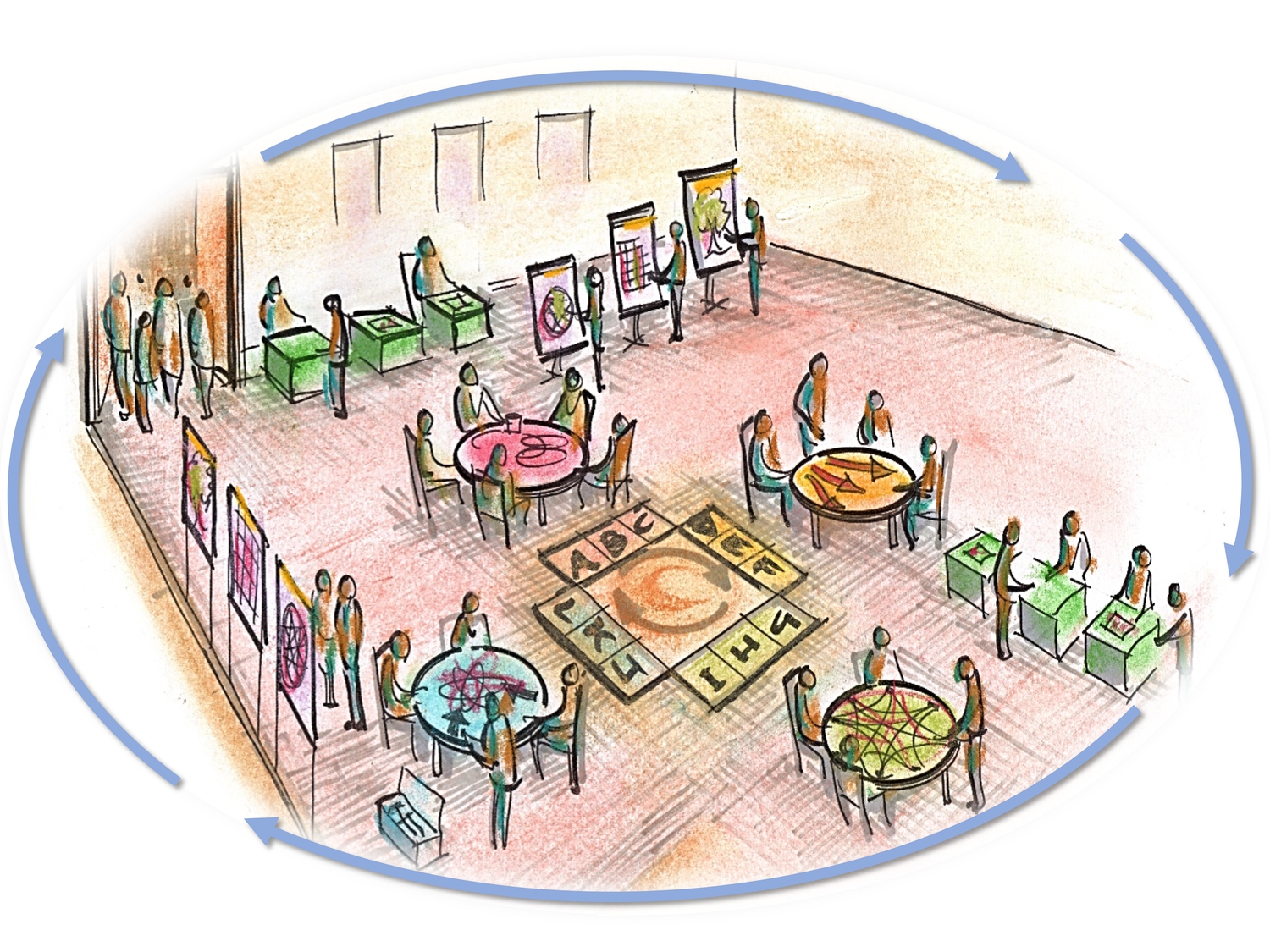
UPDATE:
The experimental first phase (2020-22), gathered 600+ participants, in 23 public meetings with 52 invited speakers.
We are now preparing for a second phase, with major grant application, along with a community platform and international steering group. This includes 4 main strands:
- Projects & case studies: experiments & applications, new & ongoing;
- Community & dialogue: debates and symposia, ‘lab tours’, online comment;
- Research & publication: compile special issues and a multi-author ‘CI-Book’ (‘collective intelligence book of online knowledge’);
- Policy & practice: disseminate results, methods & tools, with ‘white papers’ & practical guides.
This is planned as a multi-year program, exploring a range of topics in 3 key themes and their intersections:
- Cities: ‘Peri-urban-wise’ & ‘MCR-wise’
- Technologies: ‘Smart-wise’ & ‘Local-wise’
- Ecologies: ‘Climate-wise’ & ‘Bio-wise’.
- ‘Foresight 3.0’ is at the intersection of these clusters, with studies on collective intelligence, futures methods & applications: (with case study of ‘Pandemonics-3.0’ 2020-22).
See the source text, for a demonstration of the cognitive systems / synergistic approach, with pathway mappings and a cartoon guide: Deeper-City: Collective-Intelligence-and-the-Pathways-from-Smart-to-Wise –
The Cities theme here includes the Future-wise-cities theme at the Manchester Urban Institute. With the Manchester region as a long running case study / Living Lab, this brings synergies between the local and global community.
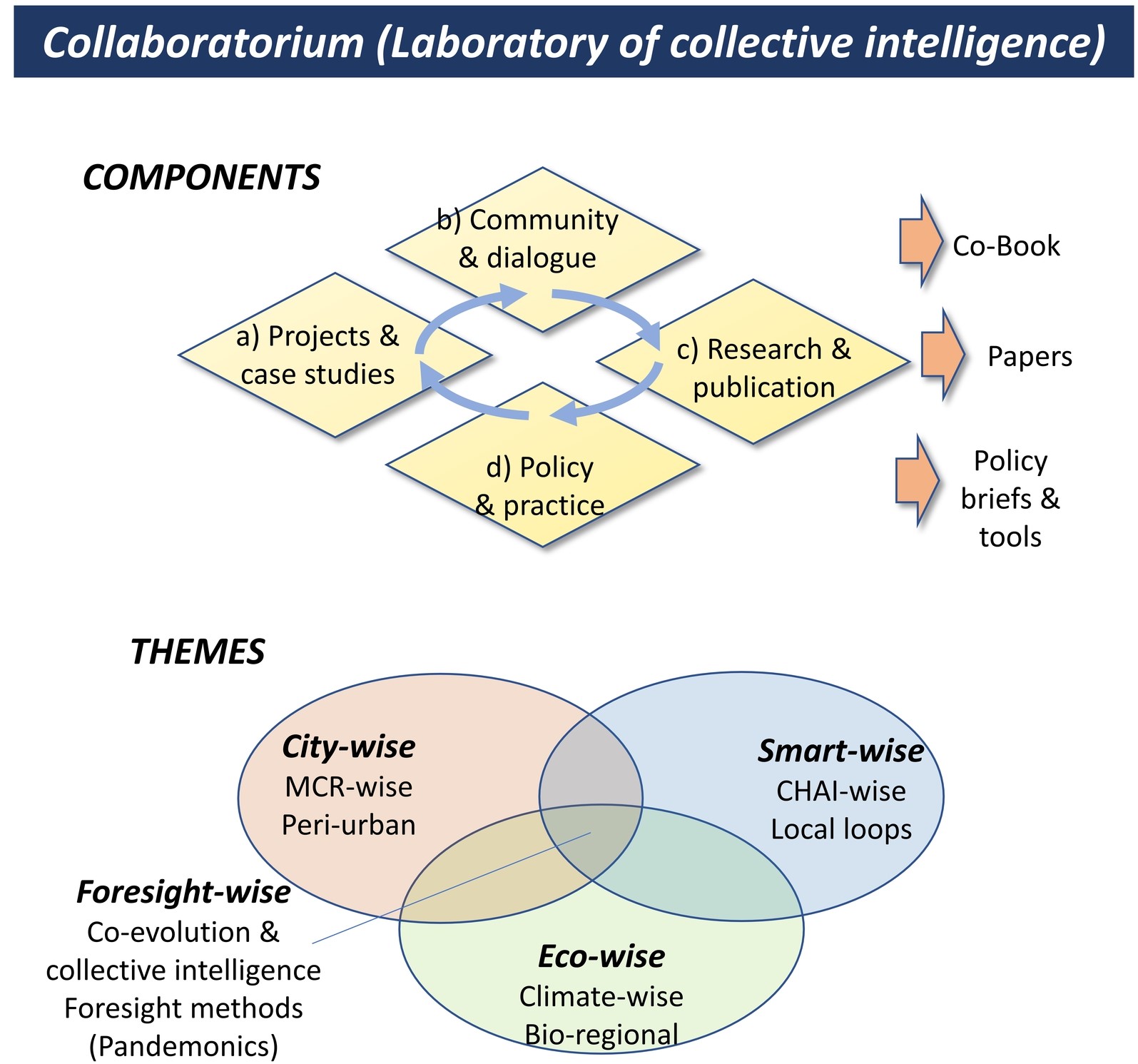
In the Eco-wise theme for example, the ‘Green New Deal 3.0’ conversation explores how technology change can fit with economic, social, political and cultural change. Either we leave all these combinations to chance – or – we look for some kind of ‘collective green intelligence’ which can put them together… The Deeper City book has a first rough outline – so we can build on that to do it for real, with collective learning, thinking co-creation and road-mapping the pathways forward.
Meanwhille… every theme and question here is affected in some way by the Covid pandemic, and so there’s an urgent and cross-cutting agenda – ‘turning crisis to opportunity’, out of the chaos & disruption of 2020.
Overall these Future-wise / Synergistic Conversations aim to explore the pathways towards transformation, from cities to climate change, and from food to finance. They aim to design ‘next generation’ systems around the principles of collective intelligence – an age-old theme, but now with new insights and tools.
What kind of Collaboratorium will emerge from this unique program is yet to be seen – but certainly the process will be unique and intriguing…
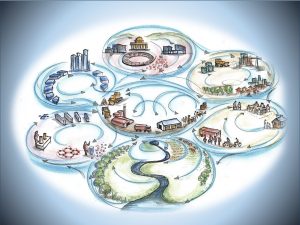
Green New Deal 3.0 – deeper systems mapping of a ‘circul-onomics’
2022 PROGRAM
Foresight-wise theme
(a.k.a Foresight 3.0)
Many cards are up in the air with the pandemic – a ‘hyper-wicked’ problem, with deeper threat multipliers all around. How to manage such transformations, and steer from crisis to opportunity? Can we envision a next-generation practice of futures and foresight, which has never been so urgent? Such a Foresight-3.0 would follow the principles & practice of collective anticipatory intelligence: both within the foresight process, and for the potential transformations around it.
Work in progress & background – Foresight-wise theme
Issues & challenges include:
- Foresight & futures methods & applications
- Science technology innovation (STI)
- Social, economic, political innovation & transformation
Core partners: HSE Moscow: SAMI Consulting, tbc.
Co-productions: Foresight Journal, 2022 special issue, platform including papers, perspectives, comments.
Upcoming….
- Climate-wise – new world disorder – April 8th 2022 – in a world of disruption and conflict, how to manage our common climate
- Eco-WW3.0 – Sept 30th 2022 – If a climate-induced world war is even a remote possibility – we need ways to think ahead for a viable future with all on board…
Smart-wise theme
The smart city is here but ‘unevenly distributed’.. We have next generation urban engineering, along with political surveillance, corporate data extraction and extremist conspiracies. This theme explores some of the most topical and urgent questions of our time: how to navigate the moving tech frontiers, how to resist ‘surveillance capitalism’, and how can ‘smarter’ technology work with ‘wiser’ human systems of collective intelligence? This then meets the reality test of governance and co-governance at the local level of neighbourhoods, inclusive communities and social livelihoods.
Work in progress – smart-wise theme
Issues & challenges include:
- CHAI (Collective Human-Artificial Intelligence).
- Urban re-engineering – technology application in the real world
- Smart-wise communities – between the ‘tribes’ of social media
- Local democracy & community development – enabling & mobilizing
Partners: Shanghai Smart City Development Institute: Manchester City Council
.
Eco-wise theme
Climate-proofing transitions and adaptations are not only economic and technical, but social political and cultural – so how to bring all these together, and mobilize all human resources? Meanwhile there are new forms of development in the ‘peri-urban’ between and around cities, often in the line of flood, fire, storm and other climate hazards. And then we can explore the circular labyrinth of food-energy-water, and the question of resilience to what and for who?
Work in progress – eco-wise theme
Issues & challenges include:
- peri-urban & urban-regional development
- climate change adaptation, risk & resilience
- food-energy-water & natural capital
- bio-regional & circular economy
Upcoming….
- Peri-cene 3.0 – 5th & 7th Sept – global project launch in conjunction with the Planning Research Conference (Manchester) and the World Planning Schools Congress (Bali)
- Climate-wise – new world disorder – April 8th 2022 – in a world of disruption and conflict, how to manage our common climate
- Eco-WW3.0 – Sept 30th 2022 – If a climate-induced world war is even a remote possibility – we need ways to think ahead for a viable future with all on board…
City-wise theme
(content in progress)
here we explore the dynamics of human settlements, the hubs and crucibles of co-evolution. Our case studies look in 2 directions –
a) the global peri-urban – as on the project https://peri-cene.net/. From space, the human impact on the planet can be seen with the spread of cities – but cities themselves are spreading into much larger sprawling areas around and between. The planet has entered a ‘Peri-cene’ – the ‘peri-eco-urban anthropocene’ – a new kind of global human-environment system shaped by peri-urbanisation.
b) ‘as local so global’…. so we explore the future of the Manchester City-Region – new pages coming shortly – following on the 2016 UK foresight program (legacy on https://gm2040.com/ . )
Issues & challenges include:
– can the city of 2052 be a site of multi-cultural emancipation – OR – surveillance & extraction?
– can the city of 2072 be globally distributed, in the face of climate change & geopolitical migration?
Upcoming….
- Peri-cene 3.0 – 5th & 7th Sept – global project launch in conjunction with the Planning Research Conference (Manchester) and the World Planning Schools Congress (Bali)
PREVIOUS SESSIONS 2021-22
Fore-wise sessions
- Strategic policy intelligence for cities & regions – how to do next generation policy & planning? practical applications in public & corporate sectors (with HSE): April 14th
- Foresight from theory to practice: Training capacity building (for the HSE Masters program): April-June
- Pandemonics 3.0: tools for collective foresight intelligence, turning crisis into opportunity (hosted at ORS63), Sept 15th
- Foresight – going viral? Oct 21st– taking FS3.0 upwards & outwards (hosted at the XI Conference on Foresight and STI Policy, HSE Moscow).
- Climate-sight-3.0- beyond COP26 – thinking ahead in disruption & opportunity – Feb 4th
- Climate-wise – new world disorder – April 8th 2022 – in a world of disruption and conflict, how to manage our common climate
Smart-wise sessions:
- Smart-wise cities 3.0 How to design ‘smarter’ technology to enable ‘wiser’ human systems? (with Shanghai SCDI): Feb 26th
- Smart-wise-Locality 3.0 – how to take smart-wise governance to the streets? practical applications on the urban frontline (with Manchester City Council): June 25th
- Smart-wise CHAI (growing the ‘Collective Human-Artificial Intelligence’): how to turn tech disruption into social opportunity? October 22nd
- ‘Smart-wise metro-scapes 3.0’ mobilizing the digital hinterland for human synergy: (tbc)
.
Eco-wise sessions:
- Green new deal 3.0 – how to do carbon neutral / net-zero pathways that really work?? (with EC-JRC): March 26th 1200 GMT
- Bio-regional 3.0 : how to tame the global tiger? (with Univ Granada & UC San Diego): May 27th ;
- (Peri-cene.net/ Policy Lab workshops): interactive sessions, also open for special interests (dates tbc in June-July);
- Food 3.0 – how to link agro-ecology, super-food & urban livelihood? (with Camley St Community Land Trust): Sept 24th; TBC
- Resilience 3.0 – how to cope with 2, 3 or 4 degrees: Oct 14th
- Climate-sight-3.0- beyond COP26 – thinking ahead in disruption & opportunity – Feb 4th
- limate-wise – new world disorder – April 8th 2022 – in a world of disruption and conflict, how to manage our common climate
PREVIOUS SESSIONS 2020-21
Foresight city/region 3.0
Friday April 14th 1330 (UK time)

This interactive Conversation explores in practical terms, how a next-generation Foresight-3.0 can enhance the ‘strategic policy intelligence’, and its applications in public policy and corporate strategy.
In collaboration: Institute for Statistical Studies and Economics of Knowledge, HSE Moscow https://issek.hse.ru/en/
Hosted: ISSEK in the framework of the XXII April International Academic Conference, HSE Moscow
Details & registration – ISSEK conference page
Foresight 3.0 & Pandemonics 3.0
This workshop is located at the Operational Research Conference 2021 – a great meeting point for all systems thinkers & managers of complexity…
September 15th 11-1230 BST
Smart-wise cities 3.0
smart cities versus wiser citizens??
Friday February 26th 0930-1100 GMT 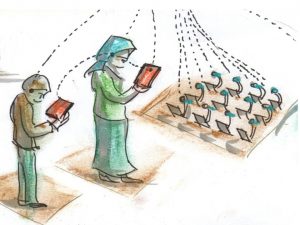
The smart city is here but ‘unevenly distributed’. Manchester for example, has been a pioneer of digital city systems for 30 years, but so far we see growing numbers of hungry, homeless, depressed, abused and excluded.
In collaboration: – Shanghai Smart City Development Institute
Registration: https://www.eventbrite.com/e/smart-wise-cities-30-tickets-125288085035
Smart-wise Locality-3.0
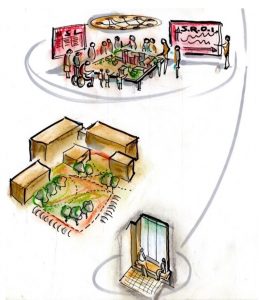
Friday 25th June – 1300
This session follows on the ‘Local-co-governance’ workshop in 2020: and the challenges raised on scale, complexity, exclusion, controversy and alternative truths. Here the focus is on the ‘smart-wise’ governance – a very practical agenda on how technology can enable (or possibly disable) the ‘collective local intelligence’.
Registration: https://www.eventbrite.com/e/localities-30-tickets-145116339879
Smart-wise-CHAI 3.0
in this session we explore emerging opportunities on the human / digital frontier of ‘how society works’ – public services, governance & wider civil society, social enterprise. We focus on:
- ‘Smarter’ forms of digital governance & social enterprise: gaming, mapping, platforming – with inter-connections to –
- ‘Wiser’ forms of human governance & social enterprise: collaborative, learning, inclusive etc – which grow the ‘collective local intelligence’ –
Date: Friday 22nd October 2021, 0930 BST
Green new deal 3.0
deeper transition for low carbon / high prosperity
Friday March 26th 1200-1330 GMT

The Low-Zero Carbon transition is urgent … but to make it work, technology change has to somehow fit with economic, social, political and cultural change. Either we leave all these combinations to chance, or, we look for some kind of collective carbon / climate intelligence which can put them together…
Collaboration: with the EU-JRC Working Group on Understanding and Managing Industrial Transitions – https://s3platform.jrc.ec.europa.eu/industrial-transition
Registration: https://www.eventbrite.com/e/local-onomics-30-tickets-129996742757
Bio-regional 3.0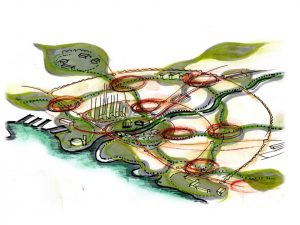
Thursday 27th May 1700 GMT
IN a world of climate chaos and disruption, the bio-regional is a logical solution. But all around, powerful forces push in other directions – global finance and supply chains, international migration, extraction and privatization of water / energy / materials… So the bio-region has never been so crucial and so challenging. We need to raise the game, to explore the potential of social innovation & policy learning, for a ‘collective bio-regional intelligence’.
Registration: https://www.eventbrite.com/e/bio-regional-30-tickets-145276593201
Food 3.0
Sept 24th 2021 (tbc) – moved due to the pandemic – aiming for blended online / on-site in London:ith extended session over 2 half days: 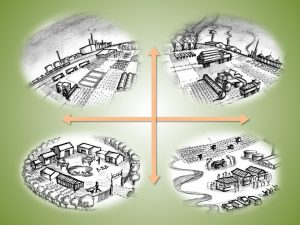
The principles of agro-ecology and food democracy are now established – but to make them work we need some kind of collective food intelligence – in food systems, trade rules, supply chains, land management, urban-rural linkages and so on. (For post-Brexit UK this is especially topical…).
This Conversation builds on the agro-ecology & food democracy movements, to explore synergistic opportunities and pathways.
(hosted by ‘the world’s most sustainable food company’ – Alara Wholefoods and the Camley Street Community Land Trust
Registration – contact joe.ravetz@manchester.ac.uk
Phase I Conversations
(resources are available on the links below, feedback is welcome, and various follow-ups are in progress).
- Dec 19th: Civic-Co-Design 3.0 (cities as process): rethinking computational design for deeper social, ecological, cultural complexity (with the Harbin Institute of Technology, China).
- Dec 10th : Foresight 3.0 – (literacy for transformation): testing methods for the ‘collective foresight intelligence’ for pandemic strategy and management – (hosted at the UNESCO Futures Literacy summit)
- Nov 27th : Smart-wise-3.0 (rethinking cities): smart cities versus wiser citizens?? Blending online with on-site (hosted by SAIARD – South Asian Institute for Advanced Research and Development)
- Nov.12th: Foresight 3.0: (game-changers): exploring the potential of ‘collective anticipatory intelligence’ for grand challenges (hosted by Higher School of Economics, Moscow).
- Nov.5th: Covi-city-3.0: for the rethinking of post-covid spatial planning and design, we need to talk about the ‘collective socio-urban intelligence’; (hosted by the World Planning Day in S Africa);
- Oct.30th: Green-deal-3.0 (circul-onomics): new livelihoods with a ‘collective climatarian intelligence’ – how to get the science/tech, economics, politics, culture, psychology and urban systems all working together?
- Oct 23rd: Deeper-city-3.0 (bio-regional): exploring the potential of social innovation & policy networks based on a ‘collective eco-urban intelligence’ (hosted by Universidade Autonoma Baja California, Mexicali).
- Sept 18th: Anti-city 3.0: ‘Cities but not as we know them’: building collective peri-urban intelligence in a fragmented world (hosted by the Auroville Institute for Sustainable Architecture, India).
- Sept 11th: Deeper Covi-City 3.0: the pandemic has brought conflicts to the surface, but also potential for transformation – here we explore the ‘collective urban intelligence’ in turning crisis into opportunity.
- Sept 4th: Foresight 3.0: amidst disruption and turbulence, how to look and plan ahead? This calls for futures / foresight methods with next generation learning & thinking built in.
- Aug 25th: Pandemic-city 3.0: the post Covid-19 urban agenda, ‘from crisis to transformation’ (hosted by the South African Centre for Cities).
- July 10th: Smart-wise-cities 3.0: building the CHAI – ‘Collective Human-Artifical Intelligence’ – with the International Smart City Forum (hosted at the World Artificial Intelligence Conference Shanghai).
(Note – “3.0” is shorthand here for ‘Mode-III collective intelligence’)
Deeper City – exposition
‘DIY Futures’ – at the UNESCO summit on Futures Literacy
Thursday Dec 10th 2-3pm GMT
hosted at the Foresight Journal ‘exhibition booth’ at the UNESCO Summit

Deeper City explores the collective intelligence – learning and thinking at higher levels. It addresses the combined challenges of cities, economies, ecologies, technologies and political systems. It maps out 40 pathways in diagrams and images, from local neighbourhoods to global finance, and from smart-wise cities to global climate.
This session will introduce the story of Deeper City – the insights and methods – and how they can be used, from the grand challenges of the 21st century, to practical local problems and opportunities.
Interactive thinking is what it’s all about – so you are invited to visit the ‘white-room’ and make a contribution – https://app.mural.co/t/collaboratorium2552/m/collaboratorium2552/1605890783029/8adb66a286dc17d8d671504125147384788d3594
Also…. you are invited to join a unique experiment in the ‘collective urban intelligence’ – the ongoing program of Synergistic Conversations
Information: this session is hosted at the UNESCO Summit – https://en.unesco.org/news/learning-envision-future-first-world-summit-futures-literacy-unesco
Link to join – https://zoom.us/j/7977057858
Lo-co-gov-3.0
new models for ‘collective local intelligence’
Tuesday October 20th – 1600-1730
Online
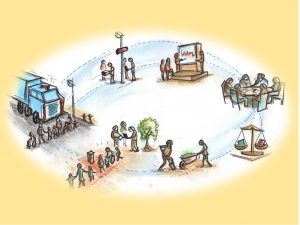
(in association with the Looper – www.looperproject.eu )
Many around the world have voted to ‘take back control’ – but what is this ‘control’ and where is it taken? Recent work on collective local intelligence shows the opportunities and challenges, in transforming from top-down ‘government’ to a more synergistic ‘co-governance’.
This is the agenda of the ‘Lo-co-gov-3.0′: more than just smart tech-enabled government, it’s about how people and organizations and public services can learn and think together, and create new ways of living and working – an overall collective local intelligence.
This Conversation has 3 main aims:
- Test a practical model for ‘collective intelligence-3.0’ in ‘local collaborative governance’; with the practical question of ‘community trusts’ for land / housing / ecosystems: (ownership, stewardship, collateral, management etc).
- Map the effects of the Covid-19 pandemic, and possible ways to turn crisis into opportunity;
- Outline practical steps to take this forward: i.e. research / policy programs, funding, networks;
As ever the session aims to turn insights into action – for policy, research, business and grassroots action …
It also draws on insights from the new book Deeper-City-Collective-Intelligence-and-the-Pathways-from-Smart-to-Wise,
The session also follows on the launch conference of the Looper, SUNRISE, Cities-4-people and Metamorphosis projects – welcome to join this on https://www.polisnetwork.eu/event/mobilising-mobility-towards-sustainable-mobility-one-neighbourhood-at-a-time/
Panel: Beth Perry, Univ of Sheffield: Jonas Bylund – JPI Urban Europe: Karen Lucas, Univ of Manchester: Andy Karvonen – KTH Stockholm: Evelyn Gustedt – ARL Akademie fur Raumforschungund und Landesplannung: Patrick Hanfling, Manchester City Council
Flyer – Lo-co-gov-3.0 – flyer
Materials – lo-co-gov-3-0-materials– and – Looper-summary-brochure
Registration – https://www.eventbrite.com/e/lo-co-gov-30-tickets-123021904829
Foresight 3.0 –
literacy for transformation
Thursday December 10th: 0900-1030 (UK time)
online, hosted by the UNESCO Summit on Futures Literacy

This third session in the Foresight 3.0 series is an exploration of ‘literacy’…
Can we design next-generation foresight methods, on the principles of collective intelligence? This interactive Conversation explores the scope of a next-generation Foresight-3.0, using the case study of the pandemic. Each of these questions highlights a different angle.
- How mapping deeper layers can help to explore ‘deeper opportunities’
- How collective intelligence can enable new forms of ‘collective foresight’
- How integrated futures literacy can help to run a country
- How Foresight-3.0 can build new bridges for science / policy controversies
This interactive session is one of a series putting together an online book / platform on ‘collective anticipatory intelligence’ – a Foresight-3.0 theory and practice – with the prime case study of the Covid-19 pandemic… We look forward to discussion for action…
Panel: Ozcan Saritas, HSE Moscow & Editor of Foresight, (Curator): Joe Ravetz, Manchester Urban Institute: Peter Black, One Health Foresight Consultant & Veterinary Epidemiologist: Bisan Abdulkader, School of Collective Intelligence, UM6P, Morocco: Yanuar Nugroho, Indonesian Government Advisor, CIPG Jakarta: Fabiana Scapolo, EU-JRC Policy Lab: Prof. Ian Miles, Univ. Manchester
Materials –
- flyer, program, background papers on foresight 3-0 materials
- Interactive whiteboard on https://app.mural.co/t/collaboratorium2552/m/collaboratorium2552/1604930703991/fd94046507b68ac066d32ca58b6330ff739a7fef
Information – this Conversation is hosted at the UNESCO Summit on Futures Literacy – https://events.unesco.org/event?id=255234025&lang=1033
Registration – https://www.eventbrite.com/e/foresight-30-the-literacy-of-transformation-tickets-129900605207
Peri-cene 3.0
climate-proofing the city-between
Friday January 29th : 0900 (eastern zones) and 1700 (western zones)
Online
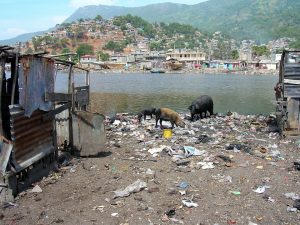
This is to launch the Peri-cene, the peri-urban side of the global Anthropocene. The project explores the material facts of peri-urban development and climate change, and then the synergistic effects of wider / deeper dynamics – social, cultural, political. The synergistic method is a guide to the key questions:
- What problems and system challenges are on the table?
- Which possible futures and scenarios can we see ahead?
- What opportunities & synergies based on collective intelligence?
- Which pathways and strategies could take these forward?
This workshop is part of the Peri-cene project – http://peri-cene.net – and its Policy Lab of 21 partner cities around the world. Others with an interest in peri-urban / climate challenges & pathways are also very welcome.
Panel: Policy Lab of 21city-regions, UN-Habitat & ICLEI
Materials: http://peri-cene.net
Registration: contact joe.ravetz@manchester.ac.uk
Smart-wise cities 3.0
smart cities versus wiser citizens??
with SAIARD – South Asian Institute for Advanced Research and Development
Friday Nov 27th 1100 -1500 GMT: Online

Can smart technology save cities which are congested, polluted and falling apart? Or if technology is part of the problem, what other pathways are possible?
The smart city is here but ‘unevenly distributed’. We have traffic lights which see us coming, and toilets which check our health. We also have smart cities in the service of political surveillance, corporate data extraction or extremist hijack. Manchester for example has pioneered digital city systems for 30 years, but one result so far is the rising numbers of hungry, homeless, depressed, abused and excluded.
This workshop explores some grand challenges with topical case studies:
– How can ‘smarter’ technology systems work with ‘wiser’ human systems?
– How can ‘smart-wise’ systems resist corporate data extraction or the ‘surveillance state’
– How to map or design the pathways from ‘smart to wise’?
Hosted by: SAIARD – South Asian Institute for Advanced Research and Development – https://saiard.co.in/
Live channel – https://www.youtube.com/channel/UC7lc-OtxZGRg-aDPncFFaJg
Format: lecture with discussion as on SAIARD – Smart City Conclave – program Nov. 2020
Background: Synergistics – visual guide – Smart-Wise Cities
Registration: https://saiard.co.in/
Co-design-3.0
smart cities as collaborative human-machine process
with the Harbin Institute of Technology, China
Saturday Dec 19th 0830 -1030 GMT: Online
Can smart technology save cities which are congested, polluted and falling apart? Or – if technology is actually part of the problem, what other pathways are possible?
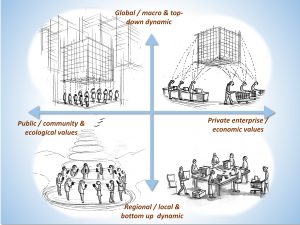
This session explores the smart-wise city – not as a thing /product – but as a process – meaning, design, finance, entrepreneurs, citizens who make day to day decisions….
- Design for smart cities, not only for buildings, but for urban digital / platform / AI systems.
- Design for ‘smart-wise cities’, not only for urban AI systems, but for integrated social / ecological urban CHAI systems;
- Parameters for computational design: deeper layers of value (social / ecological etc), and wider communities.
- Risks & opportunities for computational design: political, cultural, ethical etc
- Design theory & methodology for computational design: focusing on problems of deeper complexity & further horizons.
Hosted by: Harbin Institute of Technology, China: for the 100th Anniversary Celebration: http://en.hit.edu.cn/
Program & registration: https://mp.weixin.qq.com/s/gR6re8mGFreYDLodl2QtvA
Materials: Synergistics – visual guide – Smart-Wise Cities
Smart-wise cities 3.0
towards a CHAI (‘collective human-artificial intelligence’)
Note – change of date !! Friday February 26th – 1300-1430
Online
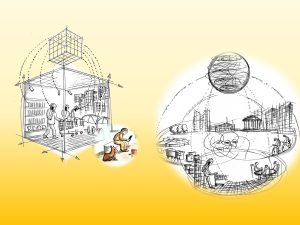
Can smart technology save cities which are congested, polluted and falling apart? Or if technology is part of the problem, what other pathways are possible?
The smart city is here but ‘unevenly distributed’. We have traffic lights which see us coming, and toilets which check our health. We also have smart cities in the service of political surveillance, corporate data extraction or extremist hijack. Manchester for example has pioneered digital city systems for 30 years, but one result so far is the rising numbers of hungry, homeless, depressed, abused and excluded.
This workshop explores some grand challenges with topical case studies:
– How can ‘smarter’ technology systems work with ‘wiser’ human systems?
– How can ‘smart-wise’ systems resist corporate data extraction or the ‘surveillance state’
– How to map or design the pathways from ‘smart to wise’?
Panel: coming shortly
Materials: Synergistics – visual guide – Smart-Wise Cities
Registration: smart-wise-cities-30-tickets
Foresight 3.0 in action
making sense of ‘unknown unknowns’
Thursday Nov 12th 1330-1530 (UK time)
online, hosted by the Moscow Higher School of Economics
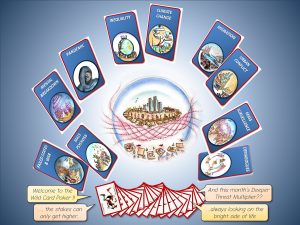
This is a follow up session to the first Foresight 3.0 in September.
Many cards are up in the air with the pandemic – a ‘hyper-wicked’ problem, with deeper threat multipliers all around. How to manage such transformations, and steer from crisis to opportunity? Can we envision a next-generation practice of futures and foresight? Such a Foresight-3.0 follows the principles of collective intelligence, both within the foresight process, and for the transformations around it.
This interactive dialogue or Mind-Lab explores a post-pandemic ‘foresight of foresight’, and practical pathways towards it. It’s also a launch of Deeper-City-Collective-Intelligence-and-the-Pathways-from-Smart-to-Wise – which brings some first thoughts on Foresight 3.0. The session follows from the first Foresight 3.0 in September, and continues to develop a program of dialogue and research / policy.
Panel: Prof. Ozcan Saritas, HSE Moscow: Prof. Ian Miles, Univ. Manchester: Geci Karuri-Sebina, Univ. Witwatersrand: Effie Amanatidou, Social Innovation: John Robinson, Munk School Univ. Toronto: Jonathan Calof, HSE & Univ.Ottawa
Materials – flyer, program, background papers on foresight 3-0 materials
Information: this session is hosted at the 10th academic conference on Foresight and STI Policy, at the National Research University Higher School of Economics, Moscow https://issek.hse.ru/en/forsconf-2020/
Registration – https://issek.hse.ru/en/forsconf-2020/
Post-Covid-Design-3.0
planning for pandemic distance
Thursday November 6th – 1200 (UK time) (World Planning Day)
Online
The pandemic impacts and lockdowns have sucked the life-blood from our cities, and divid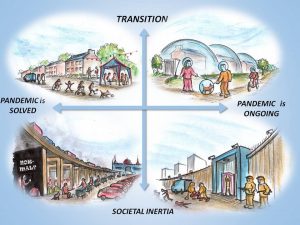 ed them into zones of safety and danger. There are massive effects on local economies, jobs, transport, housing, schools, and the most vulnerable are the hardest hit. If the pandemic continues, how to live with it: or if contained, how to turn the crisis towards transformation?
ed them into zones of safety and danger. There are massive effects on local economies, jobs, transport, housing, schools, and the most vulnerable are the hardest hit. If the pandemic continues, how to live with it: or if contained, how to turn the crisis towards transformation?
Many aim for a cleaner, greener city – but all around there are other forces, of gentrification, financialization, exclusion, surveillance…
Urban planning and design is then on the front-line – way beyond rule-books, maybe more like a catalyst, for mobilizing some kind of ‘collective urban intelligence’, where people and communities can learn, think, collaborate, create and produce….
To explore this we focus on one leading question –
- how can urban planners / designers contribute to the post-covid restructuring, from neighbourhoods to city-regions, and from physical layers to social, economic, ecological and cultural values?
This session has three main aims –
- Map the effects of the Covid-19 pandemic on urban systems, and the planning & design response;
- Explore how ‘collective urban intelligence’ can help to turn crisis into opportunity & transformation;
- Outline steps to take this forward: research / policy programs, funding, methods, resources, networks & communities;
The session is highly interactive, with online pre-event materials and post-event reports. We look forward to discussion leading towards action…
Conference slides: http://www.mile.org.za/WTP/Pages/Presentations.aspx
Flyer: world-town-planning-day-webinar-the-paradox-of-planning-implementation/
Materials: pandemic design materials
Registration: WPD registration
Green New Deal 3.0
‘towards a collective green intelligence’
Friday October 30th (“30-10-20”): 1400-1530 UK time
Online

The pandemic showed for the first time this century, a different kind of city, one with clean air and human-scale streets….
this is the agenda of the Green New Deal, not just to cut CO2, but to transform towards prosperity and sustainability. But we are surrounded by conflict and division – as 8 billion people all try for economic growth on one small planet, some argue for technology, others for markets, finance, regulation, lifestyle or cultural transformation….
We need ways to fit these together, to realize the potential synergies, and to map the pathways towards them. We need to step up the ability for collaborative learning and thinking – a kind of ‘collective green new deal intelligence-3.0’. And it seems the ideas from Deeper City have some useful insight here…
Again we explore around four key questions:
- What problems and system challenges have surfaced with the global pandemic?
- Which possible futures and scenarios lie ahead (i.e. not already in the textbooks)
- What opportunities and synergies for new models based on collective intelligence?
- Which pathways and strategies could take these forward & what next steps?
This Mind-Lab is both visionary and practical. While there are countless topics on policies, technologies etc, we look for the fundamentals of how things work (or not). Overall this aims towards a continuing international research & policy program on a Green New Deal 3.0.
Panel – Sarah Davies, Environment Agency: Paty Romero-Lankao, National Renewable Energy Laboratory & Univ Chicago: Suresh Rohilla, Centre for Science and Environment, New Delhi: Sayeed Mohammed, Arab League for Climate Change, Doha:Tatiana Fernandez, Generalitat de Catalunya, Barcelona: Henry Leveson-Gower, Defra & Promoting Economic Pluralism
Flyer – Green-new-deal-3.0 – flyer
Materials – Synergistics – visual guide – zero-carbon cities
Registration – https://www.eventbrite.com/e/green-new-deal-30-tickets-119864334451
Bioregional 3.0
rethinking the socio-eco-city
Friday 23rd October – 1700 UK time (0900 PDT)
Online
(hosted by Universidad Autonoma de Baja California, Mexicali).
 This session is about the learning-thinking city-region, in touch with its ecological-cultural roots – a ‘bio-regional 3.0’.
This session is about the learning-thinking city-region, in touch with its ecological-cultural roots – a ‘bio-regional 3.0’.
But all around there are other powerful forces – global finance and supply chains, international migration, extraction and privatization of water and energy and materials, and meanwhile the growing vulnerability of cities to every natural disaster – fire, flood, drought, heat, storm, tide and hurricane…..
So the bio-region has never been so crucial and so challenging. We need to raise the game, to explore the potential of social innovation & policy learning, for a ‘collective bio-regional intelligence’
So we focus on leading questions, in the North American context –
- starting from the typical system of exclusion and fragmentation, how can a ‘collective bio-regional intelligence’ work?
- Can this connect between social, technology, economic, ecological, political and cultural forces?
We look forward to discussion leading towards action…
Panel: coming shortly
Materials: bio-regional & eco-urban materials
LInk to live feed: https://www.facebook.com/fadmexicali/ (no registration needed)
Deeper Covi-City 3.0
Friday Sept 11th – 1300-1430
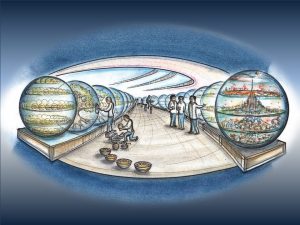
Many cards are up in the air with the pandemic – and the future of cities is crucial. Should we expect divided cities policed by surveillance cameras and paramilitaries? Or can we realize the aspirations for clean air and social inclusion? How to turn the urban crisis towards transformation?
This interactive Mind-Lab explores the post-pandemic ‘Deeper Covi-City’ – one where the many layers of economies, technologies, cultures, psychologies, and social systems all connect.
It’s also a launch of the new book –
Deeper-City-Collective-Intelligence-and-the-Pathways-from-Smart-to-Wise,
with a road-testing of ideas by online visual dialogue, for a concept proposal for international funding.
With: Joe Ravetz, University of Manchester UK
Panel (from east to west): Sheila Sri Prakash, Shilpa Architects, Chennai: Christina Garzillo, ICLEI: Maria Cerreta, University of Naples: David Rudlin, URBED: Rachel Cooper, ICA, Lancaster University: Ulysses Sengupta, Manchester School of Architecture: David Feeney, Chief Planning Officer, Leeds: Peter Marcotullio, City University New York.
Materials – Deeper covi-city-3.0 – flyer – & briefing paper on Pandemic 3.0
Registration – https://www.eventbrite.com/e/deeper-city-30-tickets-115378233402
Anti-city-region 3.0
Friday Sept 18th – 1200-1400
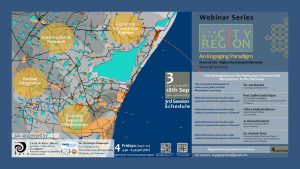
‘Engaging Cities, but not as we know them’: collective peri-urban intelligence in a fragmented world.
(hosted by the Auroville Institute for Sustainable Architecture, with the Indo-German Centre for Sustainability: both in Tamil Nadu, India).
On a global scale, the challenge of urban development is a peri-urban problem, with huge populations now in harm’s way – extreme heat and wildfire, sea level rise and hurricanes, flooding and water stress of all kinds… And the pandemic is not making this any easier….
It seems that conventional models of ‘resilience’ or ‘adaptation’ are not enough in the face of deeper and wider challenges – we need transformational models to get the science/tech, economics, politics, culture and psychology all working together – a kind of ‘collective resilience intelligence’.
This session is the third in a larger program ‘the City & its Region’, organized by the Auroville Institute for Sustainable Architecture, together with the Indo-German Centre for Sustainability, Tamil Nadu, India
It’s also a launch of the new book – Deeper-City-Collective-Intelligence-and-the-Pathways-from-Smart-to-Wise,
with a road-testing of ideas by online menti-meter…
With: Joe Ravetz, University of Manchester UK
Panel: Joe Ravetz, (UOM), Uthra Radhakrishnan, Sudhir Chella Rajan (IGCS) (host Christopher Woiwode, Lalit Bhati (AISA)
Flyer: https://www.facebook.com/EngagingCitiesInitiative/
Materials: https://www.dropbox.com/sh/fnvztutg85k8k1j/AACqlche8HgcoQcdGpe8f19va?dl=0
Registration: https://www.facebook.com/EngagingCitiesInitiative/
Pandemic-City 3.0
Tuesday Aug 25th 1000-1230 (SAST) (0900-1130 UK time)
Online – see registration link below
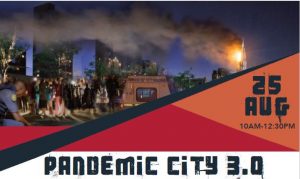
The post Covid-19 urban agenda ‘from crisis to transformation’
Hosted by the South African Cities Network and University of Witwatersrand School of Governance
In combination with the book launch –
Deeper-City-Collective-Intelligence-and-the-Pathways-from-Smart-to-Wise
The pandemic impacts and lockdown responses have sucked the life-blood from our cities. If the pandemic continues, how to live with it? If it is contained, will cities just bounce back to the old ways, or just possibly forward to some kind of transformation? This is the agenda of the Pandemic-City-3.0: not only public health, but also economies, technologies, governance, urban design and so on. We look for possible synergies and transformations in each of these, based on collective intelligence, i.e. deeper and wider learning and thinking, between all concerned.
This first session is hosted by the South African Cities Network and the University of Witwatersrand School of Governance. The focus is on Southern Africa but the session is open to others interested in the bigger picture.
Materials – Pandemic-City-3.0 – flyer
Briefing papers on Pandemic 3.0 & Dealing-with-covid-19-in-the-towns-and-cities-of-the-global-south/

Registration – Pandemic-City-3.0 -ResponsePage
For more information please contact Sadhna Bhana at sadhna@sacities.net or 082 505 0669
.
Foresight 3.0
Friday Sept 4th 1300-1430
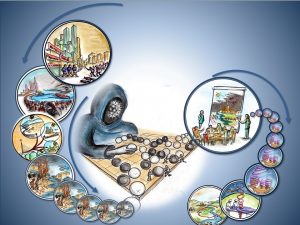
Many cards are up in the air with the pandemic – a ‘hyper-wicked’ problem, with deeper threat multipliers all around. How to manage such transformations, and steer from crisis to opportunity? Can we envision a next-generation practice of futures and foresight? Such a Foresight-3.0 could follow the principles of collective intelligence, both within the foresight process, and for the transformations around it.
This interactive dialogue or Mind-Lab explores a post-pandemic ‘foresight of foresight’, and practical pathways towards it, using online visual dialogue.
It’s also a launch of Deeper-City-Collective-Intelligence-and-the-Pathways-from-Smart-to-Wise – which brings some first thoughts on Foresight 3.0. The agenda is open to follow up and new initiatives.
Panel: Ian Miles, Effie Amanatidou, Ozcan Saritas, Geci Karuri-Sebina, Sohail Inayatullah, Gill Ringland, Rafael-Monika Popper, Sudhir Chella Rajan, Cat Tully, Clem Bezold, Angela Wilkinson, John Robinson,
The follow up event is now in preparation at the Russian Higher School of Economics international conference on Foresight – November 12th – details shortly
Materials – Foresight 3.0 – flyer & Deeper City – 9-4 – Foresight-III
Registration – https://www.eventbrite.com/e/foresight-30-from-crisis-to-transformation-tickets-115369298678
